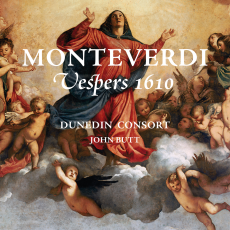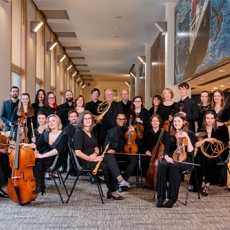Dunedin Consort - Monteverdi: Vespers 1610 - Europadisc
Monteverdi’s L’Orfeo and L’incoronazione di Poppea might be more familiar to opera audiences, and discs of the madrigals may have proliferated in recent years, but it is the Vespro della Beata Vergine, published in 1610, that are undoubtedly the composer’s calling card, both in live performance and on disc. Since their first recording in 1953 (by Leopold Stokowski, no less, with University of Illinois forces), the Vespers have become Monteverdi’s most recorded work, with iconic performances by Anthony Lewis, Jürgen Jürgens, John Eliot Gardiner, Nikolaus Harnoncourt and Andrew Parrott, among many others. Latterly, native Italian ensembles have at last made important contributions to the discography, among them Rinaldo Alessandrini’s Concerto Italiano and, most recently, La Compagnia del Madrigale on Glossa. But British groups have always been in the vanguard in this repertoire, and it is good to see (and hear) that John Butt’s excellent Dunedin Consort - hitherto best known for their fine recordings of Handel and Bach - have joined the throng, particularly in the composer’s 450th anniversary year.
In his customarily detailed and thoughtful booklet notes, Butt explains his decisions to set down what is in effect a ‘concert’ performance of the Vespers rather than a liturgical reconstruction complete with chant (as practised by Parrott and his Taverner forces on Veritas x2), as well as the use of single voices (ten in total) and correspondingly small instrumental forces (18 instrumentalists, including the six players of His Majestys Sagbutts & Cornetts). This is a very different sound from the studied grandiloquence of Gardiner on DG Archiv, and it means that, although there is scarcely any loss of opulence in Monteverdi’s majestically-scored tutti sections, the work as a whole takes on a more ‘human’ face, not just in the operatically expressive motets (or sacred concertos) interleaved between the Psalm settings, but also in the Psalms themselves and in the multi-section Magnificat (only the seven-voice version is included). This is surely an important aspect in a work that was compiled by Monteverdi after a period of crisis towards the end of his years of service in Mantua: overworked and underpaid, but also still grieving for his late wife and exhausted following the demands placed on him by the marriage ceremonies for Francesco Gonzaga.
Other issues addressed by Butt are the pitch at which the work is performed (a semitone higher than most other ‘period instrument’ recordings, lending a marked and pleasing brightness to the sound), and the use of a sampled ‘virtual organ’ to reproduce the sounds of an authentic Italianate organ within the acoustic of Greyfriars Kirk, Edinburgh, where the sessions took place. Perhaps most importantly of all, Butt offers his own thoughts on the thorny question of tempo relationships between sections, which bear fruit in some unexpected and highly persuasive changes of gear.
As for the wider virtues of the performance, any ensemble including such accomplished artists as soprano Joanne Lunn, bass Peter Harvey, and the distinctive tenor of Nicholas Mulroy has nothing to fear from competition, domestic or international. The special demands placed on the solo voices, not least the tenors, are tackled with superb stylishness: the motets Nigra sum, Duo Seraphim and Audi coelum are as compelling and convincing as on any rival recording, which is saying much. The instrumental contributions are similarly impressive, above all in the exuberantly dance-like Sonata sopra Sancta Maria, a performance positively bursting with energy and colour. Like the recording as a whole, the Magnificat achieves an ideal balance between passion and magnificence: the decision to transpose this (as well as the Psalm Laudate Jerusalem) down a fourth results in some wonderfully fruity low textures from the basses. It builds to an irresistible climax, setting the seal on a work that, in Denis Arnold’s memorable words, ‘seems to inhabit a world of its own’.
The recorded balance throughout favours the voices to just the right degree for such forces, while sounding as natural as ever from the Linn team. Rhythms are buoyant and the faster sections are generally brisk, though thankfully not to the extent of Christina Pluhar’s currently unavailable account with L’Arpeggiata. If you’re looking for an account of the Vespers that avoids the eccentrically languid speeds of La Compagnia del Madrigale or the suave extravagance of Gardiner, this endlessly absorbing, beautifully presented and intensely focused performance from Butt and his forces ticks all the right boxes. What better way to mark the 450th birthday of one of western music’s greatest geniuses?


